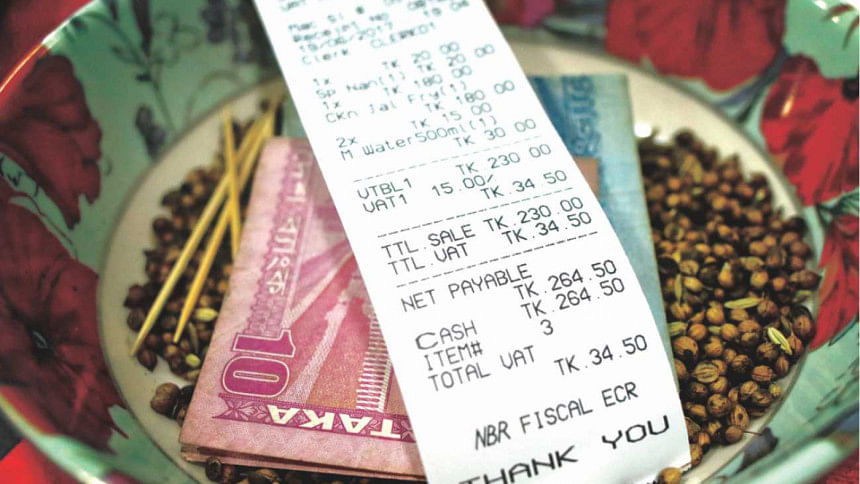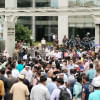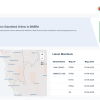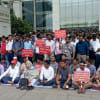Being VAT Smart

Since the announcement of the new budget, one of the main concerns of consumers countrywide has been the imposition of a flat 15 percent value added tax (VAT) rate on most goods and services. Starting from July 1, non-air-conditioned restaurants will prove costlier as VAT rates go up from 7.5 to 15 percent.
VAT has now become the largest source of revenue for the government, even more so than revenue from income tax and import duties. But does the VAT that consumers pay even go where it is supposed to?
“Certain businesses—restaurants, sweetmeat shops, and branded stores in particular cheat on paying the VAT received during transactions to the National Board of Revenue (NBR),” says Zakir Hossain, deputy project director of the VAT Online Project, NBR. However, another challenge in ensuring effective VAT collection comes from the consumers themselves.
How judiciously do consumers ask for a VAT receipt or check the electronic receipts for VAT details when paying the bill? “There is just not a practice of requesting VAT receipts or challan in this country and this is a big drawback,” explains Hossain. Often, especially small stores and restaurants actively encourage customers to opt out of VAT by not issuing a receipt. If a customer requests a receipt, he or she is then charged the 15 percent VAT in addition to their bill.
Fariya Rahman, 23, a resident of Chittagong, eats out on average five times per week. After the new imposition of 15 percent VAT on restaurants, she started being aware and asking for VAT receipts after transactions which charged VAT. “Of the two places I asked, one gave me a handwritten blue challan and the other said they had run out of the paper for receipts. Usually, such places which provide handwritten receipts do not charge VAT,” says Rahman.
However, it is now illegal for restaurants to issue blue challan as the manual system of receipts has long allowed restaurants and other business to get away with tax evasion. The government has introduced measures to ensure VAT is going into government coffers instead of being pocketed by businesses.
Since 2009, it has been mandatory for 11 types of businesses to use Electronic Cash Register (ECR) machines and Point of Sale terminals in Bangladesh. These measures are applicable for hotels, restaurants, sweetmeat shops, jewelry stores, beauty parlours, furniture outlets, community centres, stores in shopping malls, department/general stores, wholesale shops, and retailers.
This is not however the blue receipts of the past. For businesses using ECRs, consumers can simply check that their receipts show a VAT registration number or Business Identification Number (BIN). For the VAT Smart consumer, the validity of the BIN can be checked on the NBR website or via the VAT Checker app. Easily downloaded, the latter can make finding cases of VAT fraud even easier as consumers can also directly complain to the NBR using the app.
However, VAT evasion is still commonplace by shopkeepers who use non-government ECRs or display the machines but claim that these are out of order, according to Hossain. NBR is providing a further 50,000 ECRs to eligible businesses around the country in August-September of this year.
Many shops informally provide handwritten receipts if requested. In these cases, Hossain recommends that consumers still receive this challan, though invalid, following a transaction. “This way, we can eventually catch such retailers for evading or reducing VAT on official receipts,” emphasises Hossain.
In August 2016, the VAT Audit, Intelligence and Investigation Directorate of the NBR found Star Kabab and Restaurant to have evaded Tk 4.63 crore during raids on its 11 outlets earlier that year. The raids were undertaken following allegations of the business dodging taxes via phone and online over time.
Typical of many restaurants in the city, Star Kebab often issued informal receipts or no receipts at all despite having ECRs available. Under section 37 of the VAT Act of 1991, non-compliance can elicit legal action by the NBR. Following the raids, the amount of VAT paid by Star Kabab increased according to the NBR. However, customers that Star Weekend spoke to at Star Kabab claim that they still do not receive ECR receipts but rather those printed on or handwritten on their own store receipts.
The VAT system is now automated under the Value Added Tax and Supplementary Duty Act 2012. Originally intended to come into effect in 2015, it faced significant backlash from stakeholders, especially the business community. It is finally set to be implemented from July 1 this year.
“The new law is simpler, there is less distortion because a single rate is applied, and scope for tax evasion is reduced,” says Zahid Hussain, Lead Economist of the World Bank in Bangladesh, about digitisation of the VAT system. The World Bank funds and provides technical assistance to the VAT Online Project. If properly implemented, an increase in revenue collections over the next three years can be expected, leading to a positive impact in the GDP of the country, Hussain concludes.
The NBR has rolled out a dedicated website for taxpayers to learn how to register, pay, and file returns online. This is especially convenient for businesses which can now ensure regular compliance from their offices instead of rushing back and forth to the tax offices. Business owners are required to obtain a unique BIN by doing VAT registration online. As of June 18, online registration of 40,699 eBINs has taken place across the country, according to NBR data.
The Star Weekend checked the BIN status of 13 eateries and supershops by inputting the VAT registration numbers (old BINs) using the feature on the NBR website and found 12 to be registered taxpayers. One electronic receipt from a restaurant, Red Chick'n, did not have any VAT registration number printed on it, though it charged VAT, identifying the business as a non-compliant taxpayer.
Bangladeshi consumers are increasingly performing their own brand of vigilance by actively complaining about fast food shops and restaurants in particular evading VAT. Around 4000-5000 calls are received daily at the field offices of the NBR, according to Hossain. More recently, complaints (including picture evidence of receipts) are posted directly on the NBR's Facebook pages. In addition, regular Facebook status updates and posts on popular pages such as Desperately Seeking – Dhaka are done by consumers who used the NBR website or the VAT Checker app and found certain businesses not registered or using an invalid BIN.
Sumit Ahmed, owner of Kung Food, an eatery in Uttara, prefers the new online system. “Earlier, it was a hassle going repeatedly to the VAT offices, first to submit monthly VAT received and then to collect challans,” says Ahmed. His eatery uses the ECR and thinks that the new automated system of VAT collection will be smoother for restaurants.
For restaurateurs, though the new online system seems promising for smoother VAT collection, at the same time an increase in VAT may prove problematic. Customers may be dissuaded by the higher costs of eating out as a result of the increase in VAT compounded by existing service charges. This comes at a time when the restaurant business is already struggling with rising food prices and customers going out to eat less frequently.

 For all latest news, follow The Daily Star's Google News channel.
For all latest news, follow The Daily Star's Google News channel. 








Comments